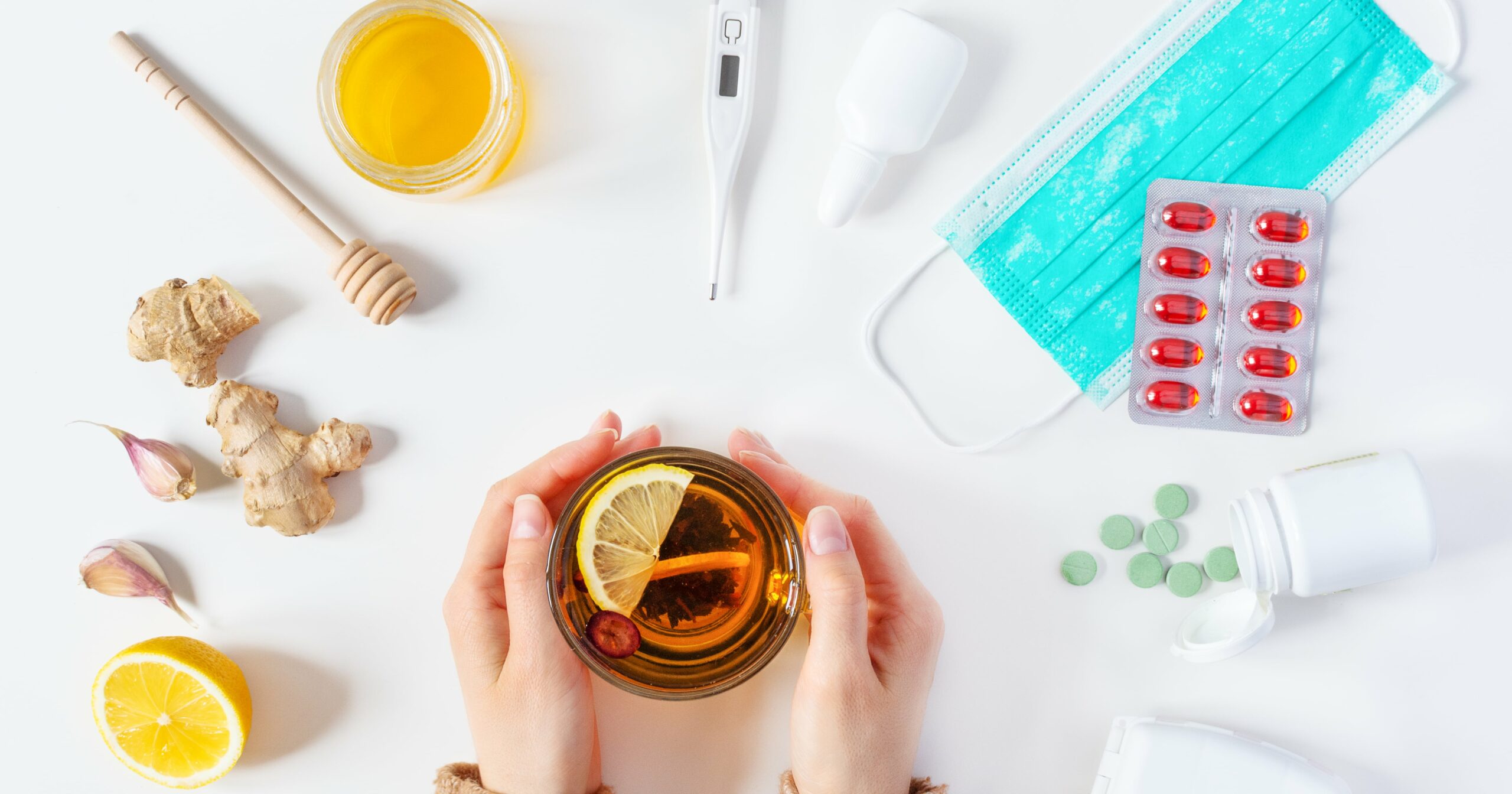There’s nothing worse than when a spring cold overlaps with seasonal allergies. But before you find symptom relief in over-the-counter cough medicine, you may find yourself asking: can you take allergy medicine with cold medicine?
The Food and Drug Administration (FDA) warns against taking more than one drug at a time – especially if both have the same active ingredient. For example, a double dose of antihistamines can cause sedation or, in severe cases, trouble breathing, according to the National Capitol Poison Center. (Remember TikTok’s unfortunate Benadryl Challenge?)
However, if you happen to be one of the unfortunate souls in this sniffly Venn diagram from hell, you’d likely do anything to find relief. Fortunately, you won’t have to go much further than your medicine cabinet. But before you do, be sure to read this advice from Erica Patel, MD, internal medicine specialist, about whether it’s safe to take cold and allergy medicine simultaneously.
Can You Take Allergy Medicine With Cold Medicine?
Technically, yes. But because symptoms are similar for colds and allergies, you don’t necessarily have to double down on the medications. Also, “many over-the-counter (OTC) cough and cold medicines and allergy medicines may have similar ingredients,” Dr. Patel notes. So it can be easy to overdo it.
Think carefully about what you actually need. “Only take medication that directly treats the symptoms you are having,” Dr. Patel says. “If you have a cough, for example, then just take a cough suppressant. Don’t choose a combination medication that also has a decongestant and a pain reliever if you don’t also have those symptoms.” That’s especially true if you’re already taking something that helps keep those symptoms at bay, like an allergy pill.
“A good way to avoid overdosing on ingredients is to compare labels,” she tells POPSUGAR. “For example, if one medication has acetaminophen as an ingredient, then avoid taking other medications with acetaminophen in them.” And be sure to check the label for contraindications. (That’s when the package says, “Don’t take this if you’re also taking ___.”) If neither is the case, “it should be relatively safe to take cold and allergy medication together as long as you’re following the dosing instructions on the package,” says Dr. Patel.
Common cold and allergy medication ingredients include:
- Pain relievers: acetaminophen or ibuprofen
- Decongestants: phenylephrine, pseudoephedrine, oxymetazoline
- Cough Suppressants: dextromethorphan, guaifenesin
- Antihistamines: diphenhydramine (Benadryl), loratadine (Claritin), cetirizine (Zyrtec), fexofenadine (Allegra)
Can You Take Benadryl and Sudafed Together?
Yes. Sudafed (pseudoephedrine) is a decongestant, while Benadryl (diphenhydramine) is an antihistamine. “Antihistamines and decongestants work differently and are often combined in cold and allergy medications,” according to the Benadryl website. “Together, they provide relief from both allergy symptoms and congestion.”
Can You Take Claritin and Sudafed Together?
It depends. If you’re considering taking Sudafed (pseudoephedrine) and Claritin (loratadine) be sure to double check the type of Claritin you have, as well as the drug facts label for ingredients. “There is no drug interaction between pseudoephedrine and loratadine, but medicines such as Claritin-D contain both loratadine and pseudoephedrine,” according to the National Capital Poison Center (NCPC).
Can You Take Zyrtec and Mucinex Together?
Typically, yes. Standard Mucinex contains guaifenesin and acts as a cough suppresant, while Zyrtec is an antihistamine, similar to Benadryl and Claritin. But certain Mucinex products contain both suppressants and antihistamines, in which case you should only take one antihistamine (either Mucinex or your allergy medication of choice). Be sure to check the drug facts section of your medications to ensure you’re not taking two antihistamines.
Can You Take Claritin and Flonase Together?
Yes. “Fluticasone (Flonase) and loratadine (Claritin) are sometimes used together for relieving allergies and do not have any significant drug interactions,” according to NCPC.
Ultimately, if ever you’re not sure how certain medications will interact with each other, reach out to your doctor or pharmacist to discuss your options.
– Additional reporting by Melanie Whyte and Alexis Jones
Melanie Whyte was a contributing staff writer for POPSUGAR. Based in NYC, she writes about LGBTQ identity, sex and relationships, pop culture hot takes, mental health, and home improvement.
Alexis Jones is the senior health editor at POPSUGAR. Her areas of expertise include women’s health, mental health, racial and ethnic disparities in healthcare, diversity in wellness, and chronic conditions. Prior to joining POPSUGAR, she was the senior editor at Health magazine. Her other bylines can be found at Women’s Health, Prevention, Marie Claire, and more.




